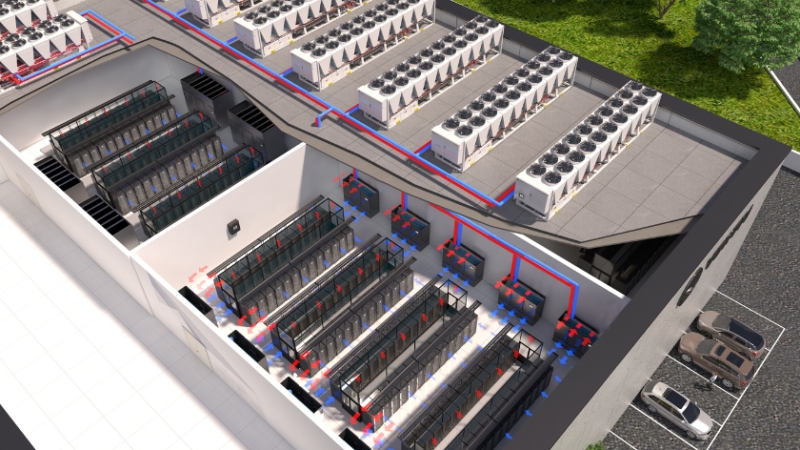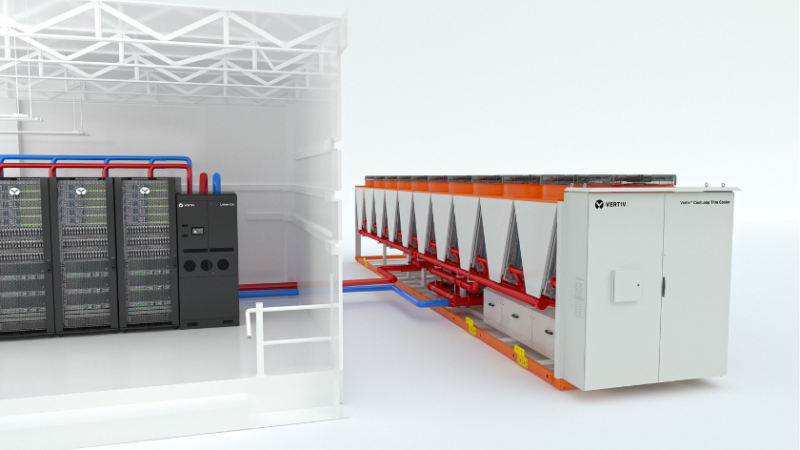The drive to pack more computing power into smaller spaces is accelerating, creating an urgent need for more sophisticated cooling solutions.
Densification is no longer a distant concept; it’s the present reality. As data centres house increasingly powerful equipment, the cooling systems must evolve to handle the surge in heat generation.
At the heart of this transformation is chilled water cooling - an advanced technology that meets the growing demand for efficiency, scalability and adaptability.
High-temperature liquid cooling systems are rising to the occasion, providing efficient solutions that address the high-density environments and rapid technological changes faced by operators.
Subscribe today for free
Rethinking cooling strategies for complex environments
The shift from long-established air cooling methods to liquid-based cooling marks a turning point in data centre design.
Next-gen chip technology is evolving rapidly, causing the water working temperature threshold to increase. This means that AI and machine learning workloads are being integrated alongside the more common systems requiring data centres to balance diverse thermal needs.
As a result, hybrid cooling strategies that combine air and liquid cooling are becoming the favoured solution, and chilled water solutions effortlessly and seamlessly enhance this type of environment.

Liquid cooling, with its ability to integrate seamlessly into existing air-cooling systems, allows operators to handle the high thermal loads of today and the future without the need to keep overhauling entire infrastructures as densities continue to increase in line with chip development.
By strategically using high temperature fluid cooling to address the most demanding heat sources, businesses can enable operational efficiency while increasing environmental responsibility.
Solving the densification dilemma
Densification presents one of the biggest challenges for data centres. While the trend is to house increasingly powerful equipment to maximise performance, it also creates intense thermal management challenges.
High temperature fluid cooling systems provide a practical solution by offering compatibility with advanced cooling methods, including immersion cooling and cold plates, which help handle the heat generated by dense workloads.

These systems help the growing thermal demands of data centres to be met without compromising performance or energy efficiency. By effectively managing the extreme temperatures associated with densification, liquid cooling helps operators maintain operational stability while optimising energy use.
The sustainability advantage: Harnessing heat recovery
Sustainability is a central concern for data centres, and energy consumption is under increasing scrutiny. Operators are under pressure to meet stricter regulations and achieve better energy efficiency. One way to address this challenge is through heat recovery.
Liquid cooling systems are pivotal to this effort. By capturing and reusing excess heat —whether for district heating, industrial processes or other secondary uses — data centres and the communities near to them, can significantly reduce their reliance on external energy sources. This not only lowers operational costs but helps meet the sustainability targets that the industry is moving toward.
High temperature fluid cooling systems are critical in this area, as they are designed to manage elevated water temperatures, high density applications and facilitate energy reuse effectively.
Preparing for future cooling demands
As technology progresses, the temperature thresholds needed to efficiently cool future AI deployments will evolve over time, with a wide landing point for expected density and temperature. The cooling systems that support data centres must therefore be equally adaptable.
Future-ready cooling solutions will need to handle higher operating temperatures as next-gen chip technology continues to develop and provide the flexibility to integrate with other cooling methods.
Key innovations in next-generation cooling technologies include modular designs, lower-global warming potential (GWP) refrigerants and higher energy efficiency. These systems are not only crucial for designing future-oriented data centres that conform to the tightening environmental regulations, but they can also help reduce operational costs.
With more demanding workloads on the horizon, data centres require cooling solutions that are both scalable and resilient.
Long-term success
The future of data centres is shaped by the dual imperatives of innovation and sustainability. As the industry grapples with the need to balance operational efficiency, cost control and environmental responsibility, chilled water cooling is positioned as a critical solution.
By providing flexible, scalable and energy-efficient cooling options, high temperature fluid cooling systems are enabling data centres to navigate the complexities of densification and rapid technological change.
Operators who are deploying AI and HPC and investing in these systems today are positioning themselves for long-term success. Designing data centres for higher water temperatures, mass densification and next-gen chip cooling by installing AI-ready solutions not only meets immediate needs, but also prepare them for the challenges and opportunities that lie ahead.
Although the industry can’t predict temperatures of the future, with the right infrastructure in place, data centres can tackle demands with confidence and reduce the risk of uncertainty by not reacting to change – instead, they can take charge of it.
Author
George Hannah, senior global director for chilled water systems at Vertiv. Hannah is an experienced chartered engineer and senior director with 20 year’s leadership experience in thermal technologies and the data centre industry.
RELATED STORIES
Vertiv and Compass unveil hybrid cooling solution for AI data centres
Vertiv's New PowerUPS 9000 shrinks footprint to boost data centre power
Nvidia, Vertiv leaders on the next steps for data centres in the AI era






